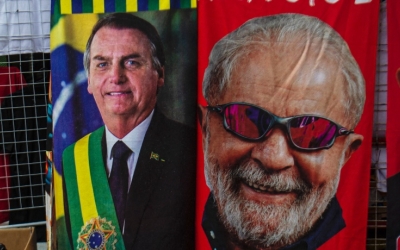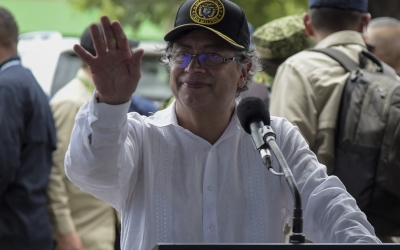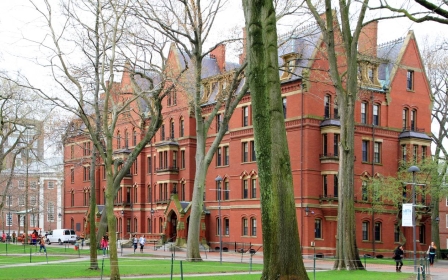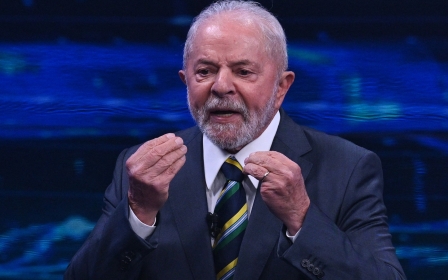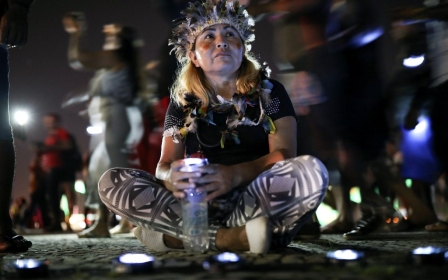Brazil elections: Why the stakes are huge for Palestinians
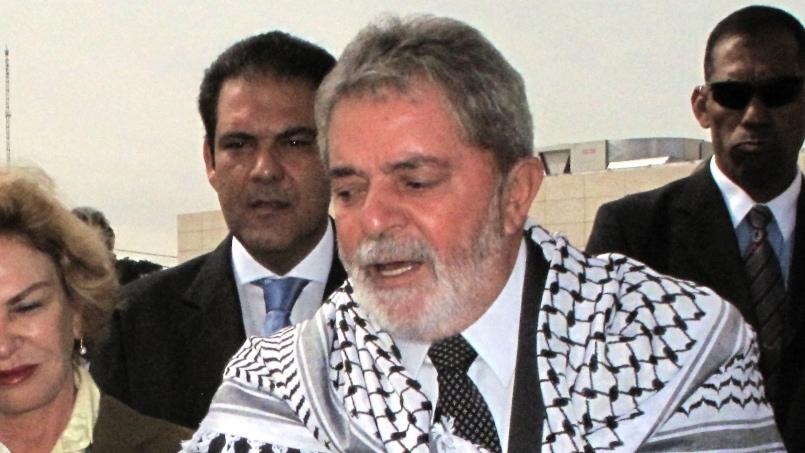
The re-election of former Brazilian President Luiz Inacio Lula da Silva could see the South American country revert back to policies in support of Palestinian rights, experts have told Middle East Eye.
This weekend, Brazilians will head to the polls in one of the most crucial votes since the military dictatorship ended in 1985.
Lula, who served as president for two terms between 2003 and 2010, is standing for re-election against right-wing populist incumbent Jair Bolsonaro.
In the first round of the vote, held on 2 October, Lula beat Bolsonaro into second place, but by an unexpectedly narrow margin. He failed to win an overall majority, forcing the two into Sunday's run-off vote.
Most polls suggest Lula is ahead by only a few points, but the outcome is anyone's guess. In a deeply polarised country, a victory for either of the larger-than-life characters will have a profound impact on Brazil and its place in the world.
New MEE newsletter: Jerusalem Dispatch
Sign up to get the latest insights and analysis on Israel-Palestine, alongside Turkey Unpacked and other MEE newsletters
Nowhere is this more visible than when it comes to Israel and Palestine. And with Brazil being home to roughly half of Latin America's population, its leanings on the issue may influence the rest of the continent.
Sayid Tenorio, the vice-president of the Brazil-Palestine Institute, said relations between Brazil and Palestine would likely see a major reorientation if Lula secured re-election.
Earlier this year, the 76-year-old met with members of the Palestinian community in Brazil and stressed that the Palestinian people had the right to live in a "free and sovereign state", adding he would work to re-establish the leading role of Brazilian foreign policy in the mediation of conflicts and of peoples' right to defend themselves.
If elected, Lula will benefit from his reputation as a leader with experience in conflict resolution and will be able to recover Brazil's diplomatic tradition, Tenorio told MEE.
"Despite the right-wing majority in Congress, Lula will have autonomy as the executive leader to guide foreign affairs," he said.
Lula's support for Palestinian rights was evident shortly after he entered office for the first time in 2003. In December of that year, he visited Syria and pushed for the creation of a Palestinian state, remarks which raised tensions in Israel. Months later, the Brazilian government opened a diplomatic office in Ramallah.
And seven years later, in December 2010, one of Lula's last acts in office was to recognise Palestine as an independent state within its 1967 borders.
"After that, several Latin American countries followed Brazil and also gave their recognition to Palestine," Tenorio added.
Even after his term ended, Lula's successor, the first female president of Brazil, Dilma Rousseff, followed his leftist policies and piled pressure on Israel over its military operations in the besieged Gaza Strip.
Ualid Rabah, the president of the Arab Palestine Federation of Brazil, told MEE that Lula was also crucial in forming the Summit of South American-Arab Countries - which called for tighter political and economic links between the regions and demanded that Israel disband settlements and retreat to its borders before 1967.
"In his first mandate, Lula launched the Summit of South American-Arab Countries. The United States tried to halt it, and Israel wanted to take part in it. Lula's administration managed to avoid both."
Bolsonaro - an aberration?
Shortly after entering office in 2018, Bolsonaro - a self-styled nationalist inspired by Donald Trump - pledged to reverse decades of Brazilian foreign policy concerning the Israeli-Palestinian conflict.
In 2019, he announced plans to move the country's embassy to Jerusalem and recognised Israel's claim over the city. While he later backtracked on the embassy move, he did open a trade mission in Jerusalem, which triggered anger among Palestinians.
One of his sons, Congressman Eduardo Bolsonaro, also made an effort to advance technological and military deals with Israel when he led the Chamber of Deputies' committee of foreign affairs.
"At the same time, four bilateral deals established between Brazil and Palestine in 2010 took too long to be approved in Congress due to the actions of Eduardo Bolsonaro, and his allies and have not been ratified by Bolsonaro yet," Rabah said.
Bolsonaro's connection to Israel in part stems from his strong support from Brazil's evangelical movement. In recent months, the right-wing populist has tried to cast his re-election bid in biblical tones.
"It is a fight between good and evil," Bolsonaro said at a "March for Jesus" event last month. "I believe in God and I believe in you. And this victory will be ours," he said.
Berenice Bento, a professor at the University of Brasilia who conducts research about human rights and the Palestinians, told MEE that "there has been an enormous increase in the adoption of Israeli symbols by Evangelical Christians over the past few years in Brazil. The 'promised land' of Israel gathers everything that is good in the world, in their view."
She described Bolsonaro's tenure as "a moment of glory" for the so-called Christian Zionist movement.
'Those in the community who are more connected to the Palestinian cause will certainly repudiate Bolsonaro'
- Fatima Ali, Arab-Palestine Federation of Brazil
In recent years, Christian evangelicals have played a larger role in Brazilian politics, but since 2018, the movement has grown into a powerful political force.
Many prominent evangelical groups have rallied the poor behind Bolsonaro and believe the very fate of the country is prophetically linked with Israel.
As part of their belief, they refer to the occupied West Bank as the biblical lands of Judea and Samaria. For the movement, Israel has a historic right to the land.
Fatima Ali, vice-president of the Arab-Palestine Federation of Brazil, told MEE it had become common to see Israeli flags, with churchgoers using them in their social media profiles.
"During official state events, the Israeli flag frequently appears as well," Ali added.
While some analysts have viewed Bolsonaro's position on Israel as an aberration, in 1947, when the UN held its historic vote to partition Palestine, Brazil's ambassador Oswaldo Aranha presided over the session and joined the "ayes".
Aranha promoted the partitioning of Palestine and even postponed the vote for three days to ensure its passage.
While attitudes in Brazil would later shift, with the right-wing military dictatorship between 1964 and 1985 supporting engagement with the Palestinians, pro-Israel sentiment has remained high among many politicians.
"He [Bolsonaro] turned Brazilian diplomacy all around to serve the Zionist interests," Tenorio said. "That is why he also announced he would change the Brazilian embassy from Tel Aviv to Jerusalem."
Former Chancellor Ernesto Araujo, seen as a Bolsonarist hardliner, led the transformation between 2019 and 2021. According to Rabah, that was not only a political mistake but also brought economic losses to Brazil.
Tenorio said it would be far better if Brazil prioritised trade with Iran, which served as an important partner and contributed more than $8.5bn to the economy between 2019 and 2021.
"We do not need to break up our relations with Israel but we should prioritise partnerships that are beneficial for us," he added.
Atmosphere of 'racism and Islamophobia'
Despite Bolsonaro's blossoming relationship with some Gulf states, Brazil's Muslim community has been subject to an increasing number of racist and Islamophobic attacks.
In November 2021, a man broke into a mosque in Ponta Grossa, Parana State, set fire to a copy of the Quran and vandalised one of the mosque's rooms.
The rise of the Brazilian far-right has led to an increasing number of cases of religious intolerance in the country. From January to July alone, at least three have been reported every day to the Ministry of Women, Family, and Human Rights.
Most acts victimise adherents of African Brazilian religions such as Umbanda and Candomblé, but attacks against Jews and Muslims have also been reported.
Homophobic attacks have also witnessed a steady rise. According to a PoderData survey, 63 percent of Brazilians believe the LGBTQ community face prejudice in Brazil. Although 44 percent declares their support for same-sex marriage - allowed by a Supreme Court ruling since 2011 - the proportion of people against it rose from 33 percent to 39 percent between 2021 and 2022.
Many evangelical leaders have criticised the criminalisation of homophobic attacks as an attack on religious freedom. A bill proposed by a Workers' Party Congresswoman in 2006 to criminalise homophobia included a provision that determined that institutions that discriminate against LGBTQ people could have their operations suspended for three months - churches included.
The bill was approved and homophobia was criminalised by the Supreme Court in 2019. Right-wing Christians continue to use that episode to suggest the Brazilian left wants to persecute Christians.
Many Palestinian Brazilians have been following such events with discomfort. According to Ualid Rabah, more than 80 percent of the community - currently estimated at least 100,000 people - is Muslim.
"We are recent migrants. How can we tolerate an atmosphere of racism and Islamophobia?" he asked.
Bento, the professor at the University of Brasilia, said Lula was a "model of balance and fairness" for many Palestinians.
"Before Lula, Brazil was notorious among Palestinians for its football stars. After his two tenures, many Palestinians would mention him when talking about Brazil."
Nevertheless, Ali recognises that not all Palestinian Brazilians will vote for Lula. A large and complex community, part of it has the same opinions as many non-Palestinian Brazilians and are guided by individual concerns.
"But those in the community who are more connected to the Palestinian cause will certainly repudiate Bolsonaro. My father used to warn us that, in the end, we will always be seen as Arabs and Palestinians," she concluded.
Middle East Eye delivers independent and unrivalled coverage and analysis of the Middle East, North Africa and beyond. To learn more about republishing this content and the associated fees, please fill out this form. More about MEE can be found here.


